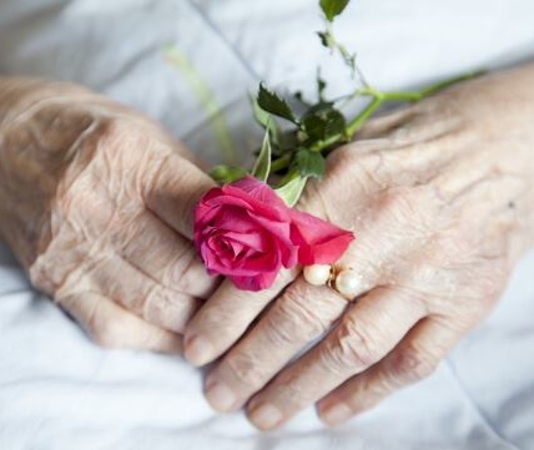We often read that the daughter or daughter-in-law steps forward to care for Mom or Dad. While increasing numbers of men are stepping up to care for loved ones, women remain the primary caregivers.
In my family of three siblings, two daughters and one son, the one who lived across the country stepped up to care for our father.
Who becomes a caregiver?
Beyond mostly women, the answer is whoever steps up during a crisis. Inevitably, this means that sons-in-law will either also become caregivers or need to support a wife who is.
In our case, the Milwaukee County Department on Aging caseworker called to say, “Something must be done for your father” After my two older siblings didn’t return her calls, someone had to do something.
She added, “If someone from the family does not intervene, we’ll order a safety check and possibly a psychiatric evaluation.”
WHAT? Here is my father, an independent and private man—a member of The Greatest Generation. An immigrant, he worked hard all his life, paid his taxes, and even worked two jobs to raise his Social Security benefits before he retired. He believed in America and the goodness of government. Now, a member of that government was about to remove him for 72 hours of observation?
“I’ll come out,” I said.
What can professionals do to help?
Before addressing how a spouse can help, we’ll take a quick look at how professionals can support families, because this lays the foundation for successful decision-making.
During the Q&A sessions that follow my presentations, government and corporate clients consistently ask, “How can we help families before there’s a crisis?”
The truth is, most families refuse to face reality until it’s almost too late—or, until there’s a crisis. During the twenty years I’ve served families and professionals caring for people with dementia, I’ve observed that most families would rather experience near death rather than deal with caregiving.
While some can’t bear seeing their parent lose ability, others deny anything is happening. Sometimes, this denial is due to being unaware of the full nature of their parent’s disease. Although my father was forgetful, I wanted to give him space to enjoy his independence. I was the youngest, the most rebellious and the first to leave home. I was rarely invited to be involved in family matters of any consequence.
It always happens though; if we don’t take steps to be involved early enough, we’ll be forced to respond to a crisis or suffer guilt. The questions we ask are: Do I go in reverse and ignore the situation? Do I keep turning left and right, vacillating in my commitment to help? Do I drive straight ahead, uncertain and a bit afraid, knowing I must face the inevitable?
When I flew to Milwaukee to be involved, the case worker was available and answered my questions. She provided me with the resources I needed.
Two weeks after I returned to my childhood home to visit my father, he and I were on an evening flight headed to Los Angeles. While he thought he was visiting us, he would likely not return. I bought a one-way ticket after my husband and I, seeing few other options, agreed he would live with us.
So, what can you expect or ask of professionals when you do need help with long-term care for your relative?
Be patient. Be supportive. Guide gently. Don’t overload with information. Answer the question and offer one more tip. Follow-up regularly. Eventually, family members grow to depend on and trust the professionals who remain engaged. In a quick-results oriented world, patience is the key to successfully supporting families facing the need for caregiving.
What can spouses, significant others and partners do to help?
While every relationship is different, these guidelines will ensure a spouse helps in appropriate ways.
- Observe to see what needs to be done.
- Step in and help with the little things. The little things add up to big things, like running out of milk, bread or medications.
- Communicate often about what is needed and when. Help by picking up a prescription or taking a loved one on a short ride. These kinds of activities will mean the world to the overwhelmed stressed-out caregiver who needs a break. Or help care for the loved one, so that the caregiver can get away.
This last tip is a bit finicky, but often reflects reality.
- Learn how the caregiver likes things done.
While there are things spouses can do without much guidance, there are other things caregivers prefer to have done in a certain manner. It may be in how quickly one likes to remove laundry from the dryer and how towels, tops and bottoms should be folded. It could be how food is prepared and how the mess is cleaned in the kitchen. In the whole scheme of life, it does not matter how you wash the grapes or cut the carrots. Yet, in the world of the stressed-out caregiver who’s trying to keep all the details together, small differences add up to a heavy burden.
Since my husband suggested that we consider moving my father into our home, he did help. It wasn’t easy, since he had a four-hour daily commute and a nine-hour workday, which meant he was gone 13 hours a day. Still, we made it work by using the community’s resources for my father’s care when lack of sleep and exhaustion lead to our own disorientation, forgetfulness and irritation characteristic of caregiver dementia.
TIPS for Communicating with SPOUSES Who Are Caregivers
- Ask questions frequently to keep lines of communication open.
- Discuss care options for Mom and Dad.
- Talk about caregiving sooner than later. Procrastinating on decisions dealing with those who brought you into this world, fed you, clothed you, loved you will result in reacting with potentially poor outcomes.
- Commit to implementing the results of your joint decisions.
We believe if we didn’t step up to care for my father, he would not have lived another five years in California, where he and my mother wanted to move to after his retirement.


.1804101401550.jpg)


